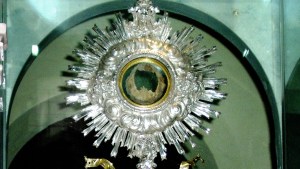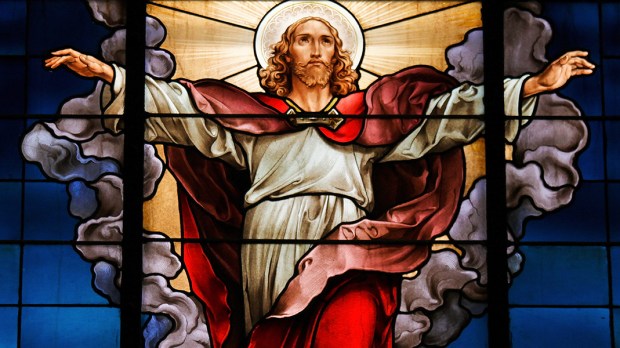Before Jesus left his apostles, he said to them, “I will not leave you orphans; I will come to you. In a little while the world will no longer see me, but you will see me, because I live and you will live” (John 14:18-19).
While in a one sense Jesus was referring to the “Advocate,” or the Holy Spirit that he gives to his apostles on Pentecost, Jesus is also referring to other ways he has promised to be “with us.”
The Catechism of the Catholic Church summarizes these particular ways he is present, which are mentioned by Jesus throughout the Gospels.
Christ Jesus, who died, yes, who was raised from the dead, who is at the right hand of God, who indeed intercedes for us,” is present in many ways to his Church: in his word, in his Church’s prayer, “where two or three are gathered in my name,” in the poor, the sick, and the imprisoned, in the sacraments of which he is the author, in the sacrifice of the Mass, and in the person of the minister. But “he is present … most especially in the Eucharistic species.”
CCC 1373
Each time we read the Bible, especially the Gospels, Jesus is present with us, though not in a visible way.
He is present when we pray, again, not in a visible way, but a real and abiding presence.
Jesus also explained to his apostles that, “Amen, I say to you, whatever you did for one of these least brothers of mine, you did for me” (Matthew 25:40). Whenever we see a poor, sick or imprisoned person, we see Jesus in a special way and our actions are done as if Jesus were that person.
Last, but not least, Jesus is present in the Holy Eucharist. This is the most tangible way Jesus is present, as we are able to accept Jesus inside of our own bodies.
In the most blessed sacrament of the Eucharist “the body and blood, together with the soul and divinity, of our Lord Jesus Christ and, therefore, the whole Christ is truly, really, and substantially contained.” “This presence is called ‘real’ — by which is not intended to exclude the other types of presence as if they could not be ‘real’ too, but because it is presence in the fullest sense: that is to say, it is a substantial presence by which Christ, God and man, makes himself wholly and entirely present.”
CCC 1374
The Eucharistic presence of Jesus remains a mystery to us, but the Church affirms that it is real, containing Jesus’ body, blood, soul and divinity.
So while Jesus may have “left” his apostles when he ascended into Heaven, he did not leave us alone and remains with us in various ways that are in some ways greater than his bodily presence in Jerusalem 2,000 years ago.

Read more:
Jesus doesn’t want us to feel alone or isolated

Read more:
4 Incredible Eucharistic miracles that defy scientific explanation

